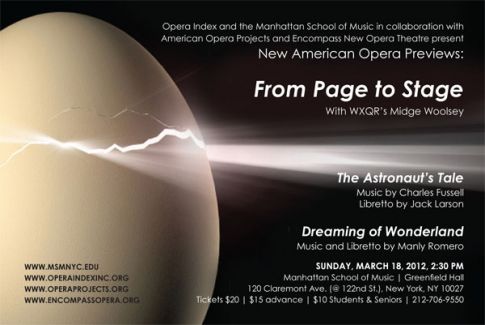
When I was asked to review The Astronaut's Tale (music by Charles Fussell, libretto by Jack Larson), I will admit that I had no idea what to expect. The blurb describes the opera as being about the "confrontation of science and religion" (which certainly raised a red flag!), but the temptation of seeing of an opera written by Larson, the original Jimmy Olsen from the Adventures of Superman, was undeniable. I should preface this review by pointing out that I have not seen the entirety of The Astronaut's Tale. I attended a preview performance which only contained about half of the opera. What I did see was a pleasant surprise; despite a rather (perhaps intentionally) overly melodramatic opening scene, the piece manages to tell a compelling tale about a young man, Abel, aspiring to be an astronaut, and what science is and is not able to provide him.
But first, the opening--a scene that is supposed to display Abel's loss of innocence, as he witnesses his dog being hit by a car and killed. This scene, and the rest of the opera, is presented with a spoken narration that (probably intentionally) is reminiscent of the stereotypical mid-century announcer, somewhere between Rod Sterling and Cary Grant. While this threw me for a loop when it first began (in my notes I underlined "Intentionally camp??" twice), it actually does a surprising job of setting the tone of the piece as the story progresses.
Abel, a hopeful cosmonaut, realizes that he has to become adept at math and science before accomplishing his goals. He meets a wandering peddler of goods (in the program he is described as an "Einstein-like" figure, which I think is a bit of a stretch) who sells him a programmable calculator, which apparently is the key to academic success. Abel, initially skeptical of modern science, and the Peddler have a great duet in which they contrast the biblical and modern cosmological genesis stories, with Abel recounting the biblical version and the Peddler correcting him with science. This begins with low-hanging fruit, equating "Let there be light" with the big bang, but also contains more subtle comparisons such as God dividing day from night compared to the scientific fact that matter and energy are one and the same, and the belief that God created man in his image against the statement that the cosmos is the actual "image of God." The music for this duet is a delight, with Abel supported by more traditional church music while the Peddler sings with a sound that sounds large, vast, and dark, but just as beautiful.
What I appreciated most about this piece, which captures a lot of the tone of the opera as a whole, is that while it compares these two ideas, it does not simply do so in the traditional "I'm right/you're wrong, I'm smart/you're stupid" structure that a lot of "science versus religion" debate quickly devolves to in modern discourse (side note: there is a monkey joke, but it is not mean-spirited). It's not that the Book of Genesis is a laughable joke--it was an attempt to explain the world we see around us, written when the scientific tools at our disposal were obviously not what we have now. I'm sure there are people out there who will find a way to take offense at this, but I thought the subject was treated with appropriate dignity. And I am happy to report that, to the best of my ability, all of the facts laid out were right (the age of the universe is approximated as twenty-thousand million years, which is pretty spot-on!).
Abel eventually works his way up in the American rocket program, and meets a tragic fate as his first flight is on a Challenger-like disaster; his last living line was the now famous, "Uh-oh." It is at this point that I felt the opera (or at least the parts of it I was able to see in preview) lost some of its focus--it dissolves into a piece of the afterlife being "in space," which from my perhaps cynical physicist point of view is not as interesting, though it was still lovely to listen to. I understand the point being made: that there are some things, such as the afterlife, which are beyond the realm of what science is tasked to explain, but to me it just came off a bit too vague and sounded of empty philosophy. I won't say this spoiled the whole show, but I will say it bothered me more than the melodrama of pet death.
On the whole, though, the opera was great-- the music was highly enjoyable, and I'm always happy to see a heroic lead portrayed as someone whose trials and tribulations involve learning mathematics and physics. I will admit, though, that the whole thing made me sad mostly for the current state of the American space program (an opera review is not the right place for a political diatribe so I will stop here). The Astronaut's Tale should remind people both of the majesty of space exploration and the amazing story of how our universe was born, and perhaps even inspire them to call up their Congressman and demand more funding for basic sciences! Sorry, couldn't help myself.
--
Matthew Roberts is a string theorist at NYU.
Excerpts from "The Astronaut's Tale" were recorded on Sunday, March 18, 2012, during聽Encompass New Opera Theatre's performance at the Manhattan School of Music. The performers were Brittany Palmer (Ann), Eapen Leubner (The Astronaut), Frank Basile (Peccavit, the old Peddler), and Christopher Vettel (The Narrator).聽The Encompass performance was the first-time聽the opera had been staged. Prior to that,聽"The Astronaut's Tale" was performed in concert聽by Collage聽New Music in 1998.